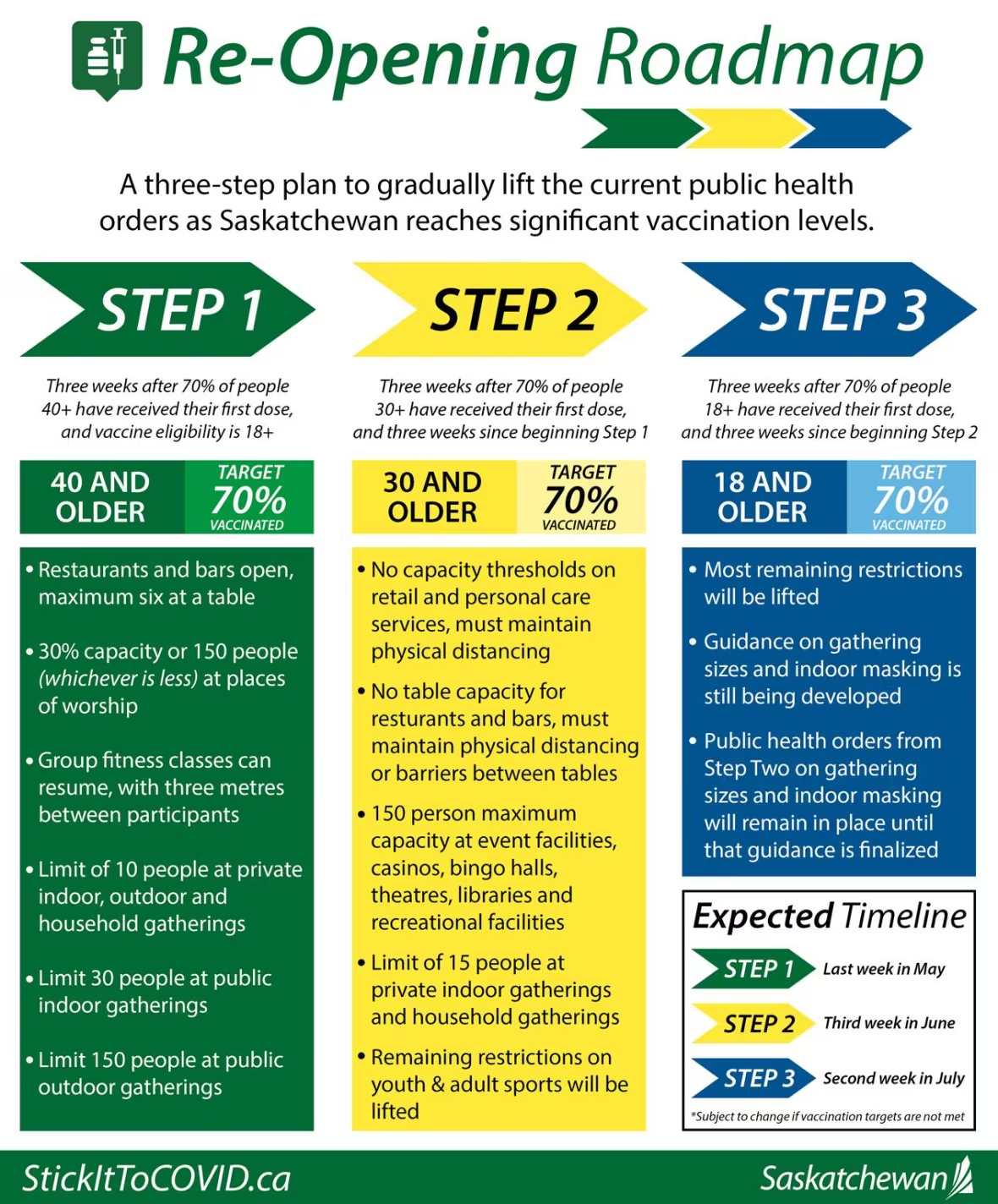With Sask. reopening tied to vaccination rates, experts hope for continued adoption
'The higher the vaccine uptake is the more protected we will be,' said Dr. Saqib Shahab.
Saskatchewan Premier Scott Moe announced the province's roadmap to reopening earlier this week, charting a course toward fewer restrictions in the province.
Experts are split on whether tying reopening to vaccination rates is a good idea, but broadly agree that Saskatchewan has done very well at getting into residents' arms.
"I think it's a huge gamble. I'll be the first to say that if it works out, it's great. I'll be among the happiest people in this province," said Dr. Nazeem Muhajarine, a professor of community health and epidemiology at the University of Saskatchewan.
The reopening will follow a three-step plan meant to function as an incentive for residents to follow health measures and get vaccinated, according to a news release issued Tuesday.
"The higher the vaccine uptake is the more protected we will be," said Dr. Saqib Shahab, the province's chief medical health officer, at a news conference announcing the plan.
Each of the stages has two thresholds that must be met before being activated:
- Step One (expected in last week of May) - Three weeks since 70 per cent of residents aged 40 and above have received their first dose, and vaccine eligibility has opened to all adults ages 18 and older across the province.
- Step Two (expected in third week of June) - Three weeks since 70 per cent of residents age 30 and above have received their first dose and three weeks since Step One began.
- Step Three (expected in second week of July) - Three weeks since 70 per cent of residents age 18 and older have received their first dose and three weeks since Step Two began.

The timelines are subject to change if vaccination targets are not met, according to a graphic released by the provincial government.
The province is well on its way to meeting the first population-based vaccination target, with 67 per cent of those 40-years-old and up having received their first dose.
With no shortage of vaccines arriving in the province in the coming weeks, there is little risk of running out.
What matters now is population-wide buy-in on getting vaccinated.
Top officials have tried to encourage everyone to get a vaccine, especially those who may be hesitant.
Health Minister Paul Merriman told media on Friday that he doesn't believe vaccine hesitancy to be an issue in Saskatchewan.
He said that educators are available at vaccine clinics to inform people of the benefits of getting vaccinated.
"We're still encouraged that people are going to be coming in no matter what age. And I want to remind everybody that if you're age category has passed, you're still eligible" said Merriman.
Experts say that the push to get vaccinated has been successful in the province.
"The reality is Saskatchewan has done extremely well in our vaccination efforts and we rank at the top of our peers in this country," Dr. Hassan Masri, an intensive care specialist in Saskatoon, said Tuesday.
"We have centres in Regina that ran out of the vaccine because of the demand. I do believe that vaccine hesitancy is decreasing because now every household in Saskatchewan, somebody knows somebody who received the vaccine and has done just fine."
Masri said getting 70 per cent of a population is "extremely attainable" and that older age groups that have been getting vaccinated first are well above that threshold.
He added that he expects vaccine hesitancy will drop even further as the number of available doses continues to increase.
The province has continued to rapidly vaccinate its population. As of Thursday it has been averaging 8,418 new doses per day, according to a seven-day rolling average.
But vaccinations alone won't quell this pandemic, according to Muhajarine,
"It is also following the public health orders," he told CBC's The Afternoon Edition earlier this week.
Read the full reopening plan here:
(PDF KB)
(Text KB)CBC is not responsible for 3rd party content
Muhajarine said that Moe's insistence that the province's reopening model was based around the United Kingdom's was missing a key component: a strict and stringent lockdown that is missing in Saskatchewan's plan.
"The U.K. actually had something to open up and they did that gradually. We haven't, you know, locked down since that first wave," he said.
Both Muhajarine and Masri agree that people should not yet relax and that the situation in Saskatchewan is still serious.
Muhajarine said he hopes people realize that a first dose of a vaccine does not mean you are fully protected against the virus. Masri said that the 70 per cent population requirement should best be thought of as a base requirement rather than a goal.
"I do obviously hope that the number will be much higher than 70 per cent. If we are only at 70 per cent, we will be, in all likelihood, in a continuous state of fighting against COVID-19," he said.
With files from CBC's Afternoon Edition and Heidi Atter


